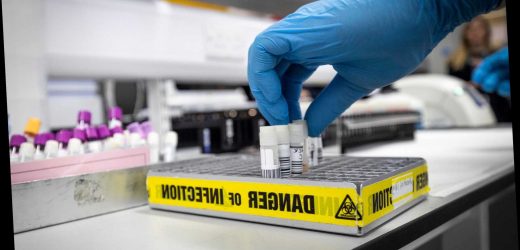CORONAVIRUS infections are still circulating across the UK with variants from different parts of the world also infecting people.
There are several in circulation from the UK variant discovered last year to the South African and Brazilian strains – but what happens when you get infected by two at the same time?
? Read our coronavirus live blog for the latest news & updates…
Senior lecturer in molecular biology at De Montfort University, Maitreyi Shivkumar said multiple variants in a person could be the result of co-infection by the different lineages.
Her comments come after Public Health England (PHE) last night revealed that a new coronavirus variant was under investigation.
PHE said 16 cases of a Covid strain known as VUI-202102/04 had been detected.
Writing in The Conversation Prof Shivkumar explained that new variants occur as a virus mutates and said that coronaviruses – like the ones currently in circulation worldwide, can under go large changes to their genetic profiles.
She said: "When two viruses infect the same cell, they can swap large parts of their genomes with each other and create completely new sequences."
Prof Shivkumar highlighted a recent discovery in Brazil where scientists recently reported that two people had been infected with two different variants at the same time.
The infected patients were found to have been infected with the Brazilian variant known as B.1.1.28 (E484K) and a novel variant VUI-NP13L – which had previously been discovered in Rio Grande do Sul.
INFECTION SEVERITY
We all know the main symptoms of Covid-19 -a new persistent cough, a high temperature and a loss of taste and smell (anosmia).
Experts previously revealed that the UK variant could have different symptoms including a sore throat, tiredness and muscle pain.
There is not yet any evidence to suggest that symptoms of the South African variant and the Brazilian differ from the three Covid-19 symptoms already highlighted by the NHS.
However, the Brazilian study claims to be the first to have found patients where two strains were present – so it's not clear whether or not symptoms could differ with different virus combinations.
Speaking specifically about the combination of the two Brazilian strains, Prof Shivkumar said: "This co-infection seemed to have no effect on the severity of patients’ illness, and both recovered without needing to be hospitalised."
This means that the two patients who had the two strains did not present differently to people who had presented with other strains of Covid.
She did however state that being infected with two variants could make a difference of how effective treatments are.
"These coexisting variants may affect how the disease progresses or how well treatments work", she added.
She said that while this is the first report of infections of multiple strains of Covid – scientist had previously discovered people who had been infected with different influenza strains.
Prof Shivkumar added: "The detection of multiple variants in a person could be the result of co-infection by the different variants, or the generation of mutations within the patient after the initial infection."
The co-infection seen in Brazil, she says, is "concerning" as it could mean that Covid-19 is acquiring mutations quicker than scientists first thought.
HOW CAN YOU BE INFECTED TWICE?
Prof Shivkumar said that with coronaviruses the combining of two strains can only be done from one or more viruses in the same cell.
She said that this had previously been seen in animals infected with coronavirus and that it was rare that a person would be infected with two strains.
"It is important to note that this requires the two viruses to infect the same cell.
"Even if a person is infected with several variants, if they replicate in different parts of the body, they will not interact with each other", she said.
SEVERE DISEASE
So far in the UK nearly 30 million people have had a first dose of either the Oxford/AstraZeneca jab or the Pfizer/BioNTech offering with over 960,000 having had their second.
The detection of new variants has been a concern for scientists developing vaccines as it's not yet clear how each jab fares against new variants.
A study last month revealed that the South African jab could reduce the protection offered by the Pfizer vaccine and experts last week warned that the Brazilian variant could slow down the UK's vaccine rollout and make it "less potent".
Prof Shivkumar said the evidence so far does not suggest that infection with more than one variant leads to more severe disease.
"And although possible, very few cases of co-infection have been reported.
"More than 90 per cent of the infections in the UK currently are by B117 – the so-called Kent variant.
"With such a high prevalence of one variant in the population, co-infections are not likely to occur.
"Still, monitoring this landscape allows scientists to track the emergence of these new variants of concern and understand and respond to any changes in their transmission or vaccine efficacy."
Source: Read Full Article






